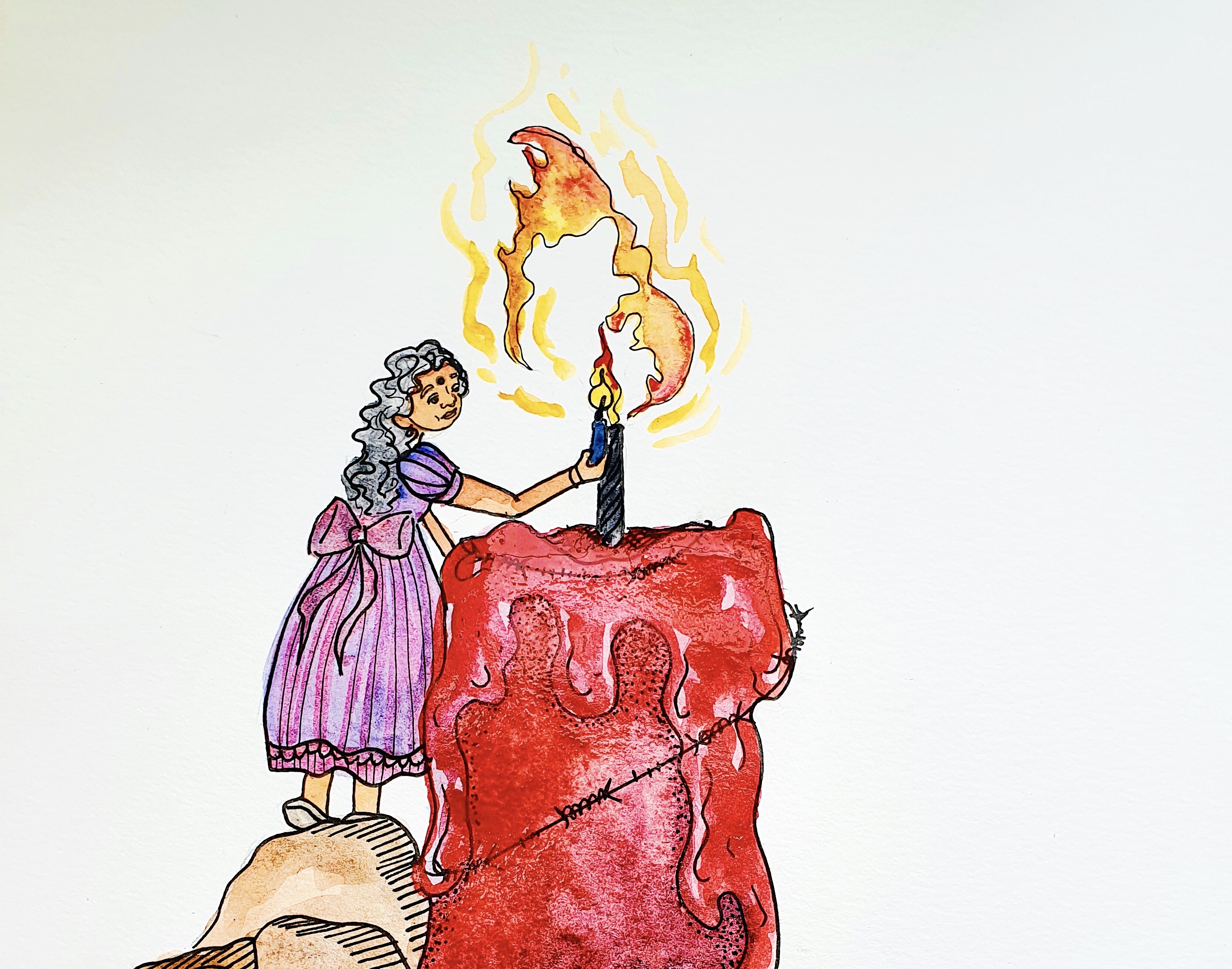
Illustration by Keera Ratnam/ waves of colour
This month in the northern city of Kopay and the eastern city of Mullaitivu, plain-clothed Sri Lankan officers photograph Tamil civilians clearing their desecrated memorials for the LTTE. This surveillance has become routine. It is often followed in rapid succession with threats, intimidation, arbitrary detention, and abuse – a pattern all too familiar for Eelam Tamils.
In the most militarised regions of the island, Tamils are prohibited from remembering the sacrifices of their loved ones for a free homeland. Under the threat of Sri Lanka’s military, grieving families are forced to burn photos of their deceased for fear of reprisal. Even lighting a lamp warrants death threats from the island’s army. Regardless of the change in the country’s leader, Sri Lanka’s military continues its attempt to stamp out Tamil memorials, which offer a salient counter to the state’s narrative.
Meanwhile, in the capital city of Colombo, the European Union’s Ambassador for Sri Lanka and the Maldives is photographed with smiling children as they parade their colourful artwork. This is part of the EU’s new initiative for “peace and inclusivity” on the fractured island. An empty gesture that Europeans have grown fond of. In March, the European embassy beamed with pride as they announced a new initiative to improve stagnant accountability on the island – a complaint box in Sri Lanka’s ministry of justice. The announcement was made as Tamil Families of the Disappeared took to the streets with black flags, demanding to know the fate of their loved ones. In these gestures, the EU not only shuns the plight of Tamils but acts to mask the grisly reality of life on the island.
These past few weeks have, however, seen a change of pace as Deputy Managing Director of the European External Action Service’s (EEAS) Asia and Pacific division, Paola Pampaloni, made a whirlwind tour of the island and meeting with the island’s leadership, civil society organisations, and the Tamil National Alliance (TNA). During these meetings, she discussed a range of issues, including the repeal of Sri Lanka’s draconian Prevention of Terrorism Act, the need for devolution, and to strengthen the Office of Missing Persons. Whilst seemingly positive, Tamils are sceptical of these gestures as it appears clear that Europe is pulling from the same playbook.
Whilst raising alarm over the continued human rights violations in Sri Lanka, the EU applauded reforms in Sri Lanka’s justice sector and recognised that the government was taking steps “to reform the PTA”. The supposed steps Sri Lanka has taken to reform the PTA comes as the government has put forwards a “rehabilitation” bill that would grant authorities broad powers to detain people in military-run centres without judicial review. Despite years of broken promises to repeal the PTA, the EU continues its blind faith in Colombo.
Perhaps most galling was the ambassador’s comments on the PTA, in which she claimed, “it has been over three years since the Easter Sunday attacks during which the Government began to use the PTA to combat terrorism”. Her comments reveals Europe's myopic fixation with Colombo and completely omit the sordid history of the draconian legislation, which has been used for decades to target Tamils on the island. Her claim that the legislation has been used to “combat terrorism” again grants the Sri Lankan state an unwarranted legitimacy as it continues to target Tamils and Muslims for crimes as grave as writing poetry or participating in a protest.
Europe’s unshaken confidence in Colombo, despite the island’s continued failure to meet its promises, explains their enthusiasm for the Office of Missing Persons – a debunked government institution, that the UN recognises, has “not been able to trace a single disappeared person”. Europe appears deaf to the calls of Tamil Families of the Disappeared who have lost faith in this domestic mechanism and have instead appealed to the international community for justice. By continuing to back these empty domestic-led initiatives the EU not only loses credibility as a voice for human rights but more importantly, justice for the Tamil survivors of genocide is further delayed.
Europe's policy towards Sri Lanka is yet to be charted; however, continued use of Colombo as their guide will only perpetuate Sri Lanka’s cycles of crisis. Instead, if the EU is to dedicate itself to “peace and inclusivity” on the island it must be willing to leave the bubble of Colombo and act upon the demands of the Tamils in the North and East. Those who have lost their children and loved ones to the army and demand to know their fate. Those who are continuing to fight back against land grabs by the military. And those who defiantly choose to remember their Maaveerar who were willing to sacrifice their own lives for the sake of Tamil freedom.
